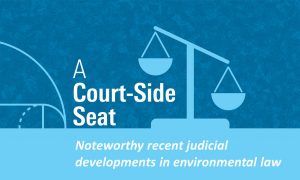In a previous post, we described how the New York City Climate Mobilization Act, 2019 (the CMA, or Local Laws 92, 94, 95, 96, 97, and 147 enacted in 2019) was passed with the goal of reducing New York City’s carbon emissions by 40 percent by 2030 and by 80 percent by 2050 (as against a 2005 baseline as provided for in item 3 of Local Law 97). It is the most ambitious building emissions law to be enacted by any city in the world. The CMA impacts “Covered Buildings” (described below) and, besides contemplating the retrofitting of Covered Buildings to achieve energy efficiency and establishing a monitoring program for Covered Buildings, the CMA contemplates compliance by means of the purchase of carbon offset credits or renewable energy. (Note the new NYC Accelerator program, launched in 2012 by the Mayor’s Office of Sustainability, provides guidance regarding energy-efficient upgrades to properties and emission reductions.)
Blockchain Innovations and Real Estate: NFTs, DeFis and dApps
 As innovative applications with integrated smart contract functionality emerge from blockchain technology platforms, there is an expanding list of digital currencies, tokens and peer-to-peer financial products and services. Abbreviations abound. There are non-fungible tokens (NFTs), which, unlike fungible cryptocurrencies, are “one-of-a-kind’ digital assets stored on a blockchain platform, and can include images, videos, recordings, collectibles and tangible items in the physical world. There is decentralized finance (DeFi), the peer-to-peer transaction infrastructure for tokens and other software applications and contracts designed to replace traditional banking products and services and streamline transactions. Decentralized applications (dApps) are a relatively new technology similar to traditional web applications from a user perspective, but which run on distributed blockchain platforms, such as Ethereum, rather than on a single computer—dApps are typically open source, allowing software developers to improve features and functions quickly, and free from control by any single authority. Smart contract protocols permit dApps to access the blockchain platform and integrate with cryptocurrencies, NFTs and DeFi projects.
As innovative applications with integrated smart contract functionality emerge from blockchain technology platforms, there is an expanding list of digital currencies, tokens and peer-to-peer financial products and services. Abbreviations abound. There are non-fungible tokens (NFTs), which, unlike fungible cryptocurrencies, are “one-of-a-kind’ digital assets stored on a blockchain platform, and can include images, videos, recordings, collectibles and tangible items in the physical world. There is decentralized finance (DeFi), the peer-to-peer transaction infrastructure for tokens and other software applications and contracts designed to replace traditional banking products and services and streamline transactions. Decentralized applications (dApps) are a relatively new technology similar to traditional web applications from a user perspective, but which run on distributed blockchain platforms, such as Ethereum, rather than on a single computer—dApps are typically open source, allowing software developers to improve features and functions quickly, and free from control by any single authority. Smart contract protocols permit dApps to access the blockchain platform and integrate with cryptocurrencies, NFTs and DeFi projects.
Bay Area Reopening Tracker (updated 6/14/21)
As new cases of COVID-19 declines, each County in the San Francisco Bay Area is reopening gradually in accordance with the California’s colored tier system. The patchwork of local rules and orders is difficult to follow. Our Bay Area Reopening Tracker is here to help. We have included each of the nine Bay Area counties, and their respective current tier, Health Order (and additional relevant orders), and our short comments regarding their status. Please check back in with us—we plan to update the Bay Area Reopening Tracker weekly for the foreseeable future.
Tracking Hydrogen Projects Worldwide
 Pillsbury—the first global law firm to launch a practice team dedicated to all things hydrogen—has again demonstrated its position at the forefront of the ongoing energy transition by launching the only public resource tracking the development of hydrogen projects worldwide. This valuable resource is accessible at www.TheHydrogenMap.com.
Pillsbury—the first global law firm to launch a practice team dedicated to all things hydrogen—has again demonstrated its position at the forefront of the ongoing energy transition by launching the only public resource tracking the development of hydrogen projects worldwide. This valuable resource is accessible at www.TheHydrogenMap.com.
Crypto and NFTs Could Help People Become Real Estate Tycoons
By using online cryptocurrency technologies like tokens and blockchains, people could participate in real estate transactions that are too unwieldy in the analog world. Soon, these technologies may let anyone with a few thousand dollars play tycoon and buy a part of a condo or iconic building.
NFTs, or non-fungible tokens—digital certificates that convey exclusive rights to something—is a new concept being applied to real estate, supporters say they will become standard in the industry.
A Court-Side Seat: Guam’s CERCLA Claim Allowed, a “Roundup” Verdict Upheld, and Judicial Process Privilege Lost
This is a brief account of some of the important environmental and administrative law cases recently decided.
THE U.S. SUPREME COURT
BP PLC, et al. v Mayor and City of Baltimore
The issue the court confronted was a procedural matter: Can the defendant energy companies use the federal removal statutes (see 28 USC Section 1442) to remove a state law climate change lawsuit to federal court? Here, a group of energy companies were sued by the mayor and city council of Baltimore in state court, where they alleged that the defendants had concealed the adverse environmental effects of the fossil fuel products they promoted and sold in Baltimore City. Several similar lawsuits have been filed in many state courts, where typically it is alleged that the defendants can be sued on various common law theories. Rather than defend these cases in state court, the defendants have sought to remove these cases to federal court because climate change liability appears to be an issue that should be settled at the federal level. These efforts have been unsuccessful, with most federal trial and appellate courts holding that the reasons cited for removal (oftentimes the federal officer removal statute) have not been persuasive. In this case, both the Maryland federal district court and the U.S. Court of Appeals held they had no jurisdiction to authorize removal, and thus returned the case to the state court. Noting that the U.S. Court of Appeals for the Seventh Circuit ruled that a removal action could be countenanced under Section 1442, thus creating a circuit split, the Supreme Court held that a straightforward reading of the removal statute empowers the reviewing court to examine all theories for removal that a district court has rejected. Consequently, the Court remanded the case to the Fourth Circuit where it can decide, “in the first instance,” whether there actually exist grounds to remove this case to federal court.
For Smart Home Technology, the Contract Is Key
 In our previous post we discussed the importance of conducting a thorough due diligence and procurement process with smart technology providers. Next up? The contract.
In our previous post we discussed the importance of conducting a thorough due diligence and procurement process with smart technology providers. Next up? The contract.
The price of a procured product is always important, but equally important are other contractual terms that reflect the commercial agreement. Ultimately, the contract should answer the fundamental question of “What are you buying?” The product itself is not the only feature being purchased. A customer is also buying certainty, service performance, risk mitigation, flexibility, security, compliance, and other similar “intangible” items of value.
Retail Debtor’s Bid for “Super” Rent Holiday and Rent Abatement Denied
“With little to no revenue at many locations, retail debtors have found it difficult during the COVID-19 pandemic to comply with Bankruptcy Code Section 365(d)(3)’s requirement that a debtor timely perform post-petition lease obligations while it decides whether to assume or reject a lease. However, given the pandemic’s lasting impact, and related governmental orders that have affected operations, revenues, and the ability to pay rent, retail debtors have considered legal strategies for obtaining, over the objections of landlords, extensions of the initial 60-day rent suspension already afforded by Section 365(d)(3). While a few retail debtors have been successful, one was not in In re CEC Entertainment.”
To read the full article written by colleagues Patrick J. Potter, Patrick E. Fitzmaurice, Brian L. Beckerman, and Kwame O. Akuffo click here.
Source: Journal of Bankruptcy Law
A Court-Side Seat: Permit Shields, Hurricane Harvey and the Decriminalization of “Incidental Taking”
This is a brief review of some of the significant environmental (and administrative law decisions) released the past few weeks.
THE U.S. SUPREME COURT
On April 22, 2021, the Court decided two important administrative law cases: Carr, et al. v. Saul and AMG Capital Management v. Federal Trade Commission.
Federal Judge Vacates CDC Eviction Moratorium Nationwide
Late last week a federal district court judge for the District of Columbia held that the nationwide eviction moratorium issued by the Centers for Disease Control and Prevention (CDC) went beyond the agency’s statutory authority and vacated it nationwide. This decision effectively expanded a similar decision by a Texas federal court last month that found the CDC’s moratorium was an improper use of federal power but limited its decision to the litigants to that case and declined to vacate the CDC order.





